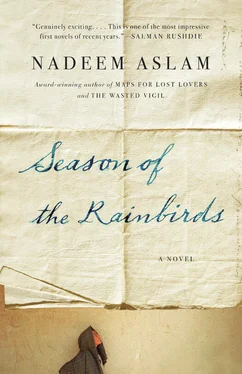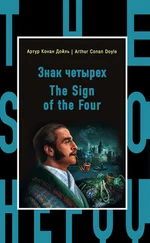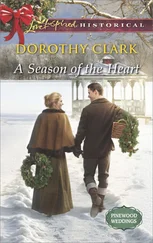Dr Sharif concentrated on his work. He had begun to feel along the edges of the wounds — clearly defined now that the excess blood had been swabbed up. Then he drenched a large piece of cottonwool in antiseptic solution and began to dress the cuts, sticking the wool to the skin with canvas tape.
‘Will I be able to patrol tonight?’ Arshad Ali asked from under the physician’s hands.
‘I would advise you to go home and get to bed. I’m sure your brother’s men are perfectly capable of looking after us.’
As it evaporated the alcoholic content of the antiseptic solution began to numb the pain. Arshad Ali smiled. ‘It’s not that,’ he said. ‘We had planned a mahfil for tonight. A roast, hemp, cane liquor. And, of course, a whore.’
Dr Sharif glanced at the closed door behind which were his living quarters and spoke in a dropped voice: ‘Isn’t there enough of that sort of tamasha in this town already? My wife was in an uproar when she found out. And people here in the surgery have been talking of nothing else for the past fortnight.’
‘I too have heard about the DC and his woman. Is she pretty?’
With difficulty Dr Sharif was cutting the hair growing around the wound in the upper lip. He stopped and looked deep into Arshad Ali’s eyes. ‘Don’t worry about it,’ he said, and after a moment’s pause he added: ‘Why don’t your brothers find you a job? A nice consular post in Argentina, perhaps.’
Arshad Ali smiled again. ‘Don’t ruin my moustache, doctor-sahib.’ The physician waited for the smile to fade, scissors suspended in air. ‘My brothers were exactly the same at my age, doctor-sahib. The Ali seed is spread liberally throughout this region. Let me ask you something … it’s a kind of joke. What happened to the man who once talked of sexual liberation? Tell me.’
Dr Sharif went over to the shelf to switch on the radio. The set, encased in dark mahogany with a cloth front, responded to the flick of the switch by emitting a grainy burst of melody. Dr Sharif lowered the volume and rotated the dial until he arrived at a frequency where someone was speaking in a foreign language. He consulted his wristwatch and came back to the couch.
Arshad Ali was waiting to complete his joke: ‘His wife bore him a daughter.’
The voice on the radio stopped speaking, and after a few bars of music and a rapid succession of pips another voice said: ‘This is the BBC World Service. Here is the news, read by—’
Dr Sharif lowered his head to the wounds.
The newscaster spoke in an impersonal voice: the monsoon floods in Bangladesh had been declared some of the worst in the region’s history. Mark Tully, speaking over the sound of a torrent, expressed fears of a famine. Geography had made Bangladesh disaster-prone: most of the country was a giant river delta less than twenty feet above sea level, lying at the heart of a natural funnel formed by the Bay of Bengal. But the effects were magnified by poverty: in a nation where more than half the people were landless, the richly fertile silt islands that appeared and disappeared offshore were a great temptation — as soon as they built up, people paddled out to settle them.
Dr Sharif went to the other side of the room to close a window that was letting in insects. He fastened the bolt. Arshad Ali had closed his eyes — enjoying the cool alcohol on his face and inhaling its light vapour. Mark Tully came to the end of his report, and the newscaster moved on to the second story.
Arshad Ali opened his eyes and let out a whistle of disbelief. Dr Sharif rushed to the radio set and turned up the volume.
‘A missile!’ Arshad Ali gasped.
Dr Sharif raised a hand to quieten him and leaned in towards the radio. The General’s plane had narrowly escaped a missile fired at it soon after take-off. The terrorist organisation allegedly led by the hanged prime minister’s son was said to be responsible.
‘A SAM-7,’ said Dr Sharif, as though he knew what that was.
The newscaster moved on. Dr Sharif stood still for a few moments, hands dropped to his side, the open-beaked scissors clucking at the floor. Then he twisted the dial and arrived — through a series of high-pitched whistles, fragments of words and strains of music — at the national station. Here too news was under way.
‘We’ll have to wait for the summary at the end,’ the physician said. They had obviously missed the lead item.
Working in silence the doctor finished dressing the wounds. Arshad Ali too listened intently. When the newscaster came to the end of the bulletin she repeated the headlines.
‘I thought as much,’ Dr Sharif said. ‘They are not going to tell us about it.’ He went to the shelf and turned off the radio with a savage twist.
‘So,’ Arshad Ali said. ‘Nothing happened?’
‘Obviously,’ smiled Dr Sharif. ‘As usual.’ He put the remains of the gauze and the bottle of antiseptic in the curved dish and carried it to the desk. Frowning, he took the pen from his pocket and began writing on the note pad. ‘The bandages will have to be changed every other day,’ he said without looking up. ‘And tomorrow’ — he tore the page off the pad — ‘send someone to the city to get these tetanus injections.’
Arshad Ali was standing up. ‘In my stomach?’ he joked and even managed to pull a face. But the doctor did not respond. He seemed eager to discuss the news with his wife.
Arshad Ali went to the door. The blood on his shirt was beginning to stiffen. Dr Sharif got up to let him out.
It was raining. Crickets sang. Darkness and silence pressed down on the huddled street; and for a brief confused moment Dr Sharif was unable to distinguish between the two. Then, filling his lungs with the warm humid air, he shouted after Arshad Ali: ‘And make sure the chemist takes the injections out of a refrigerator.’ A child had recently contracted polio in spite of the fact that she had been vaccinated. The heat had denatured the vaccine.
The town awoke to the noisy heaving of the swollen rivers. A gigantic sweep of wind, rain and thunder had invaded the region during the night. The salt from the doorsteps was washed away and the rags stuffed in the drainpipes had to be taken out to drain the courtyards. Soon the houses were again full of the dancing water lizards. Screaming with rage servant girls all over the town drove clusters of them out of the downstairs rooms, only to find, moments later, even greater numbers entering the house through the gaps under the doors and through the drains.
The sky remained hidden behind thick clouds until noon when sunlight at last began to filter through. Mr Kasmi, immaculate in his starched and pressed attire, held the closed umbrella out of the front door and, releasing the catch, stepped on to the street. Other doors were being opened, too. Mr Kasmi covered the length of the street acknowledging and returning calls of greeting. He turned into the street that led to the school. The talli trees leaned over the pavement, dripping. In the far distance someone was walking towards him. Hidden somewhere in the tallis a papiha gave its mournful call. Mr Kasmi recognised the approaching figure as the newspaper photographer. His shoulders were hunched and his hands were thrust deep into the pockets of a large raincoat. The collar was turned up against the drizzle: Mr Kasmi liked the effect. The photographer saw Mr Kasmi and came to a stop under one of the trees.
‘Saif Aziz has disappeared,’ the man said, looking dejected, as Mr Kasmi came near. ‘He’s taken the car. His things aren’t in the room and the hotel manager knows nothing.’
Mr Kasmi listened attentively. ‘Perhaps he’s gone back. It must have been an emergency,’ he said. ‘Maybe something to do with his family.’
Читать дальше












